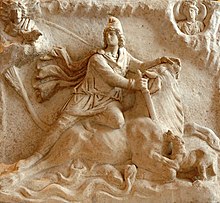미트라
미트라(Mitra / Mithra) 또는 미트라스(라틴어: Mithras)는 브라만교, 조로아스터교, 미트라교의 태양신으로, 인도-이란 제어로 ‘서약’이라는 뜻인 단어 *mitra에서 유래한 계약과 태양의 신이다. 기원전 1400년 경 히타이트와 미탄니의 후르 왕국과의 평화 조약에서 협정의 증인이며 유지자로 기원되는 5신 중의 하나로서 처음 등장하였다.
| 미트라 मित्र Miϑra | |
|---|---|
| 계약의 신이자 태양의 신 | |
| 다른 이름 | 메헤르 미트라스(Mithras) |
| 소속 | 아디트야 - 브라만교 야자타 - 조로아스터교 |
| 경전 | 베다 - 브라만교 아베스타 - 조로아스터교 |
| 무기 | 바르솜 |
| 불교 동등신 | 미륵 |

브라만교에서 미트라는 아디트야의 일원으로 같은 아디트야 계통의 신인 바루나, 아르야만과 함께 초기 브라만교의 주신으로, 바루나와 함께 우주적인 율동의 스바르가를 지배하며 동시에 낮과 빛의 하강을 담당한다.[1]
브라만교와 같은 인도이란 계통의 종교인 조로아스터교에서 미트라는 계약을 담당하는 태양신인 동시에 최고신 아후라 마즈다를 보좌하는 신들인 야자타의 일원으로 등장한다.
미트라교에서는 미트라스라는 이름으로 등장한다.[2] 미트라스(Mithras)라는 이름은 고대 페르시아의 신의 이름이었던 미트라(Mithra)의 한 변형인 것으로 학자들은 보고 있다.[3][4] 이 견해는 프란츠 퀴몽(Franz Cumont: 1868~1947) 이래의 미트라교를 연구하는 학자들 사이에서 널리 받아들여진 견해이다.[5] 미트라(Mithra)의 그리스어인 "미트라스"가 나타나는 초기의 예로는 기원전 4세기의 크세노폰(기원전 430?~354?)의 저작으로, 아케메네스 왕조의 시조로 페르시아 제국을 세운 키루스 2세(재위: 기원전 559~530)의 전기인 《키루스의 교육(Cyropaedia)》이 있다.[6]
라틴어 낱말과 고대 그리스어 낱말의 정확한 형태는 어형 변화 또는 격 변화 때문에 차이가 있다. 라틴어를 사용한 숭배자들이 "미트라스"를 주격으로 사용한 고고학적 사례가 있다. 그러나 포르피리오스의 저작인 그리스어로 된 《육식의 기피에 대하여(De abstinentia)》에는 에우불로스와 팔라스가 미트라교의 역사에 대한 책을 저술했다고 되어 있는데 이 책은 현존하지 않는다. 포르피리오스의 말 표현에 따르면 이들 두 저자들은 "미트라스"라는 이름을 격 변화를 하지 않는 외래어로 취급했던 것으로 보인다.[7]
기타
편집미트라는 게임 에이지 오브 코난에서 주신으로 나오기도 했다.
같이 보기
편집각주
편집- ↑ 2013 《베다》380쪽, 박지명 역, 동문선
- ↑ Charlton T. Lewis, Charles Short. A Latin Dictionary
- ↑ Ulansey, David (1991). 《Origins of the Mithraic Mysteries》. New York: Oxford UP. 90쪽. ISBN 0-19-506788-6.
It is therefore highly likely that it was in the context of Mithridates' alliance with the Cilician pirates that there arose the synchretistic link between Perseus and Mithra which led to the name Mithras (a Greek form of the name Mithra) being given to the god of the new cult.
- ↑ 《Britannica, Encyclopedia of World Religions.》. Encyclopædia Britannica, Inc. 2006. 509쪽. ISBN 978-1-59339-491-2.
...Mithra is the next most important deity and may even have occupied a position of near equality with Ahura Mazde. He was associated with the Sun, and in time the name Mithra became a common word for “Sun.” Mithra functioned preeminently in the ethical sphere; he was the god of the covenant, who oversaw all solemn agreements that people made among themselves... In later times Mithra gave his name to Mithraism, a Mystery religion.
- ↑ Ulansey, David (1991). 《Origins of the Mithraic Mysteries》. New York: Oxford UP. 8쪽. ISBN 0-19-506788-6.
Cumont's... argument was straightforward and may be summarized succinctly: the name of the god of the cult, Mithras, is the Latin (and Greek) form of the name of an ancient Iranian god, Mithra; in addition, the Romans believed that their cult was connected with Persia (as the Romans called Iran); therefore we may assume that Roman Mithraism is nothing other than the Iranian cult of Mithra transplanted into the Roman Empire.
- ↑ Xenophon, Cyropaedia 7.5.53. Cited in Henry George Liddell and Robert Scott, A Greek-English Lexicon
- ↑ Gordon, Richard L. (1978). “The date and significance of CIMRM 593 (British Museum, Townley Collection”. 《Journal of Mithraic Studies II》: 148–174.. p. 160:
"The usual western nominative form of Mithras' name in the mysteries ended in -s, as we can see from the one authentic dedication in the nominative, recut over a dedication to Sarapis (463, Terme de Caracalla), and from occasional grammatical errors such as deo inviato Metras (1443). But it is probable that Euboulus and Pallas at least used the name Mithra as an indeclinable (ap. Porphyry, 《De abstinentia》 II.56 and IV.16)."